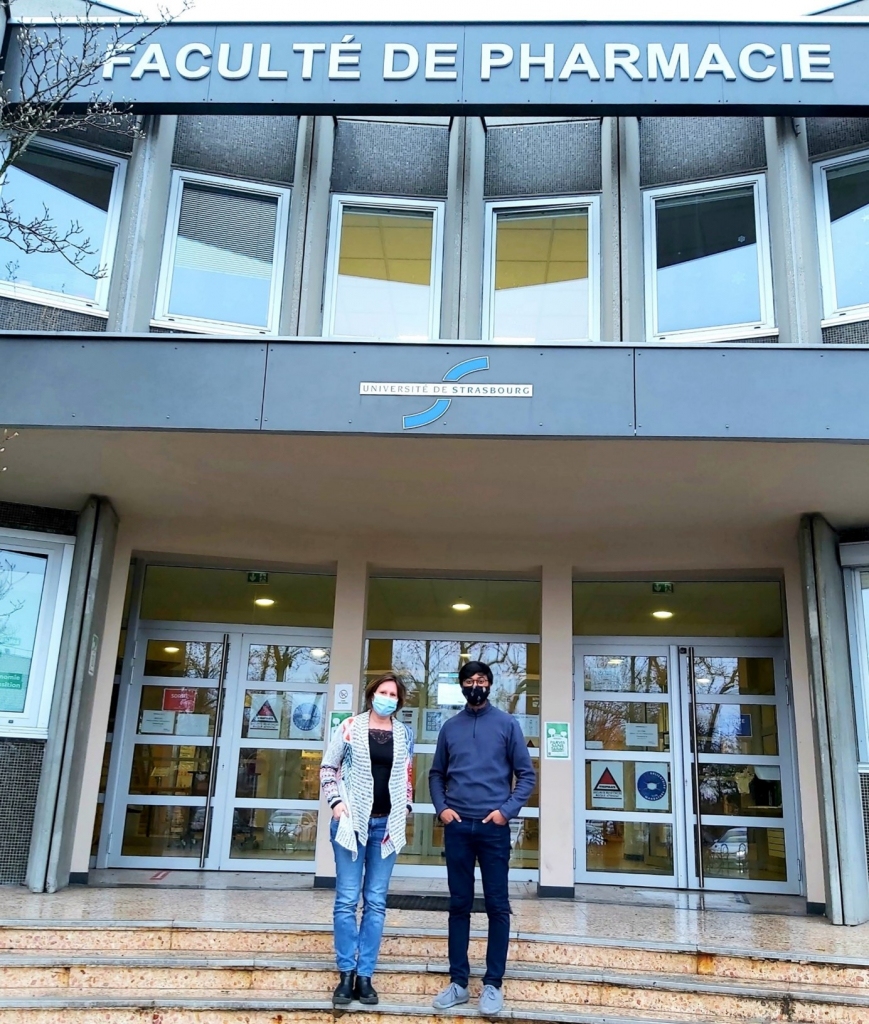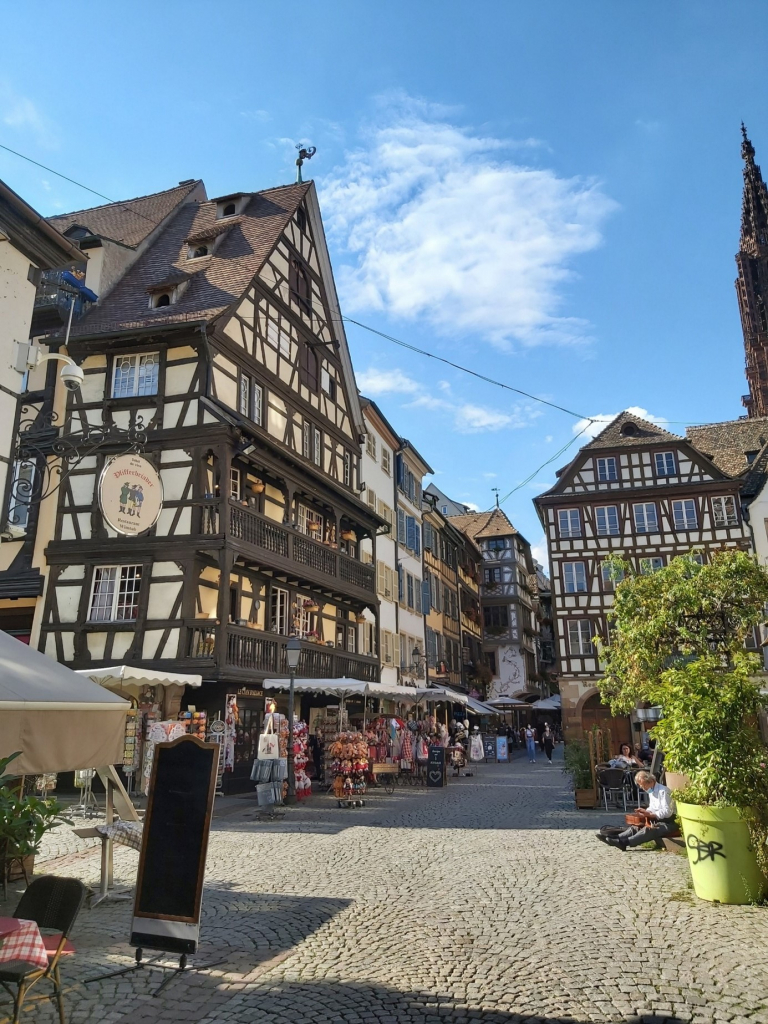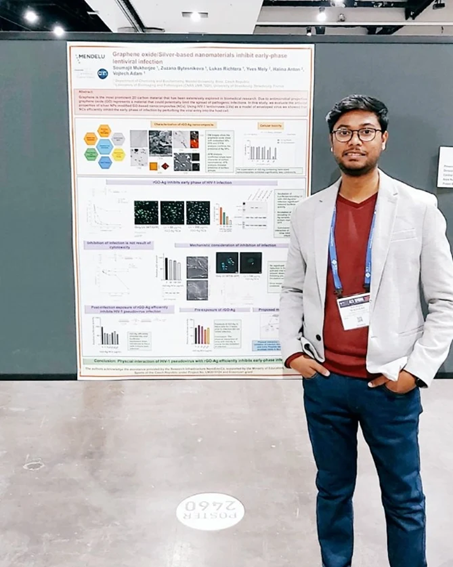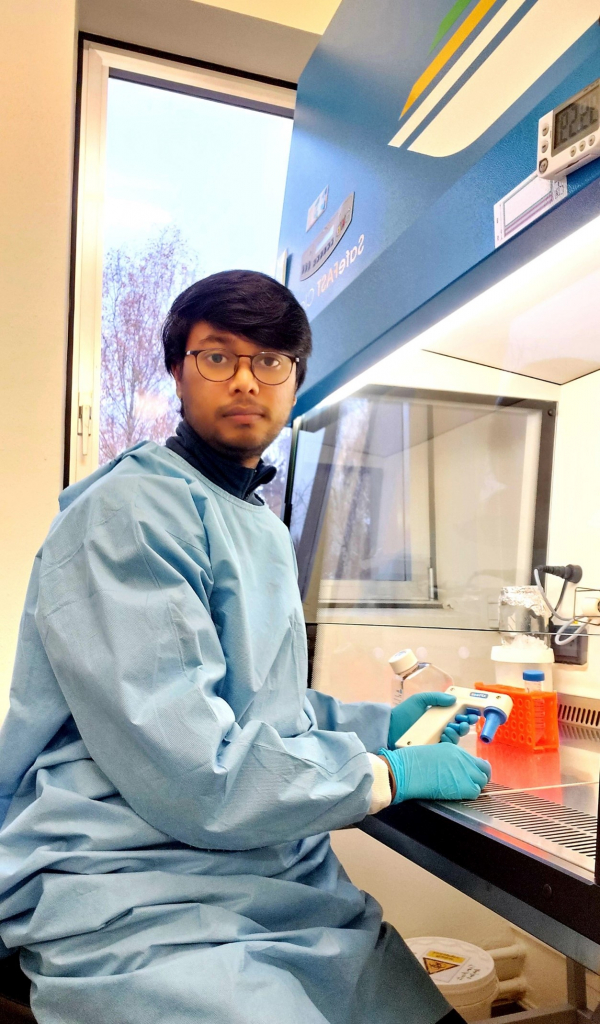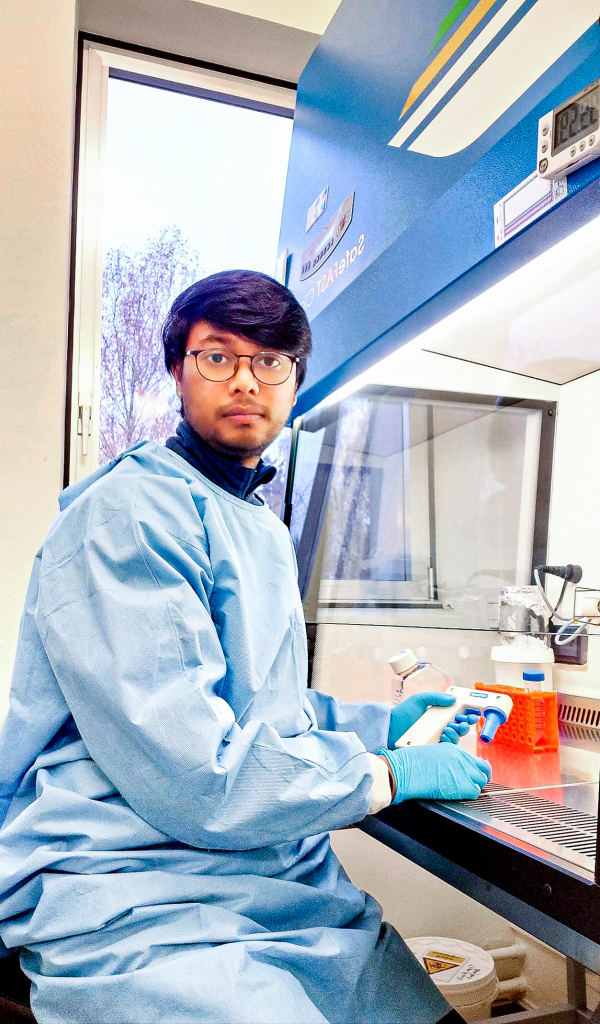
Ph.D. Studying can be one big adventure, during which you make a lot of friendships, new collaborations, you can travel a lot, go on internships and conferences, and last but not least, do research that you enjoy and makes sense of. Our student Soumajit Mukherjee, who came to the Czech Republic to study from faraway India, can also be proof.
As part of his study, Soumajit completed an internship abroad in France in the Laboratory of Bioimaging and Pathologies at the University of Strasbourg, where he was originally to spend 3 months. However, based on the interesting results of the research, he has eventually spent a much longer time there.
How did you manage to arrange an internship here?
My doctoral thesis is focused on studying the antiviral activities of novel carbon-based nanomaterials. To perform the experiments involving pathogenic live viruses, we wanted to form a collaboration with a facility that is experienced and equipped with specialized instruments for virus culture and infection studies. Dr. Halina Anton and Prof. Yves Mely from the University of Strasbourg (CNRS UMR 7021) have generously supported the idea of the shared project and agreed to allow me to use their facility. After the initial discussions, I approached the office of international relations of Mendel University regarding the options to fund the stay in France. I must mention that I have received extremely useful information and a great help to finalize the funding for the internship through Erasmus+ schemes.
Were there any complications due to the pandemic situation with your internship?
In particular, I did not face many complications due to the ongoing pandemic except for a brief time of regular COVID tests and a few restrictions of movement. As I was moving to another city in the EU from Brno, the travel was not restricted. Ms. Tereza Formackova from the International Relations office has helped a lot and handled the process very efficiently to minimize any reason to disrupt the study plans.
What is your main research about and why did you go to Strasbourg?
As I mentioned earlier, my doctoral thesis is about identifying novel anti-viral nanomaterials as an alternative to conventional therapies and drugs, like HAART in case of HIV infection. Carbon nanomaterials have been shown to bind biomolecules due to their unique physical and structural characteristics. Many studies have shown their antimicrobial effects as well. In our study, we have synthesized carbon-based nanomaterial and silver nanoparticles to study the effect of this nanocomposite in the inhibition of lentiviral infection. We are using an HIV-1 pseudotyped virus in our study and the ultimate goal is to understand the details of the anti-viral effect, such as kinetics, and the interaction between the particles and the viral particles. Also, chemically synthesized metal nanoparticles often exert some amount of toxicity in the cells. To understand the changes in cellular metabolomics and transcriptome due to the presence of nanoparticles in the cells, we are analyzing transcriptomic data from total RNA sequencing.
This planned study required a facility that allows the experiments with live virus infections and a well-equipped imaging platform. Prof. Mely and his lab at the University of Strasbourg is involved in studying viral pathogenesis for a long time now and thus hold the adequate experience to guide through the planned study. Having both the viral culture facilities and a highly-equipped imaging platform, this lab was a perfect destination for the internship.
Do you have any results yet?
I am happy to inform you that yes, we do have significant results from the study. The data that we have recorded during the past 15 months are seemingly exciting and we are looking forward to documenting our findings as a research article very soon.
Have you presented your study already at any conference?
Yes, I did. Very recently I have presented my study to two very prestigious conferences. In March 2022, I delivered an oral presentation at the American Chemical Society National Meeting 2022 held in San Diego, California in the USA. Then in April 2022, I presented my study in a poster format at the Microbiology Society Annual Conference held in Belfast, UK. Both of the conferences were fantastic opportunities to network with others working in the same field and to discuss my research to gain valuable insights.
Why exactly do you think your research is important?
Many studies have reported that carbon-based nanomaterials are toxic to microbial cells. Unfortunately, the mechanism of action behind the antimicrobial phenomena is still largely debateful. There are several hypotheses according to the previously published research articles, but the proofs that these articles carry are not sufficient. Our planned work is important right at this point. It is important to fully understand the molecular or physical action behind the effects to be able to modify and manipulate the nanoparticles in the future according to their needs. So our project is aimed at utilizing more ways to understand the nanoparticles and the changes it causes in the biological systems.
Will you continue to address this topic in the future?
I believe, due to the uniquely beneficial physicochemical properties, carbon nanomaterials are an excellent choice for various industries, such as biomedical, electronics, engineering, etc. The use of such nanomaterials has seen exponential growth in the last decades, so it is clear that carbon nanomaterials have a much sought-after value currently. It also opens the wide scope of research by harnessing the power and utilizing the graphene-like particles for energy, drug delivery, gene therapy, imaging, etc. As a future goal, I want to establish myself as a research scientist in the applications field of infection biology and I would love to remain associated to improve our knowledge about the benefits of carbon nanomaterials as antimicrobial agents.
Now you’re going to finish your doctorate in our Department, aren’t you? What is your final thesis about?
Yes, you are correct. I am in the final year of my doctoral study at our department. My doctoral thesis is broadly based on understanding the biological interaction and cellular implications of 2D carbon nanomaterials. There are two parts to the study. One part is about understanding the molecular mechanics of anti-viral activity of functionalized carbon-nanomaterial, where I am using HIV-1 as a model virus and another part is about understanding the global changes in cellular metabolism and toxicity by graphene oxide. For the latter, we are looking at transcriptomic sequencing data to understand broader effects on cellular signaling.
How would you evaluate the doctoral studies in our Department?
My thesis supervisor is Dr. Lukas Richtera and I have joined his laboratory in 2019. He always has been very supportive of the goal of the thesis work and also the requirements. I believe our department is well-equipped and my colleagues are extremely knowledgeable persons.
The collaborative nature of research is one of the key strengths here. The doctoral study program at UCB is well-structured and offers the students much-needed freedom and elasticity to define the thesis topics that allow them to present the data efficiently.
I also must mention all the helps I have received from Prof. Vojtech Adam. Without his suggestions and generosity, I would not be able to perform such a high-quality study during my thesis work. I am extremely thankful for his input and interest in my internship work.
Why do you think it is good for students/colleagues to do internships abroad?
Nowadays scientific research is a collaborative effort of people from multiple backgrounds. Meeting new people with different ideas and expertise is very crucial to solving research puzzles and also growing as an informed academician. Going to a foreign country for an internship has its own positive merits like building useful contacts and the opportunity to immerse oneself into a new lifestyle, culture, etc.
How would you evaluate the background of your internship? Are there any differences?
Internship in another place, another country always involves exposure to a different set of people with different values and cultures. While there is not much difference in the work culture, the lifestyle changes were noticeable.
Do you like living in the Czech Republic (Brno)?
I moved to Brno from my hometown Kolkata, India in 2019. Since then, I have loved my time here. Brno is such a warmly loving city, full of young people. The public transport is excellent and being centrally located on the EU map is just a cherry on the top. I have made a lot of close friends in Czechia along the way and they make my stay here fantastic. Even if my career takes me to another part of the world, Brno will always be in my heart.
